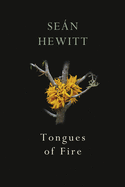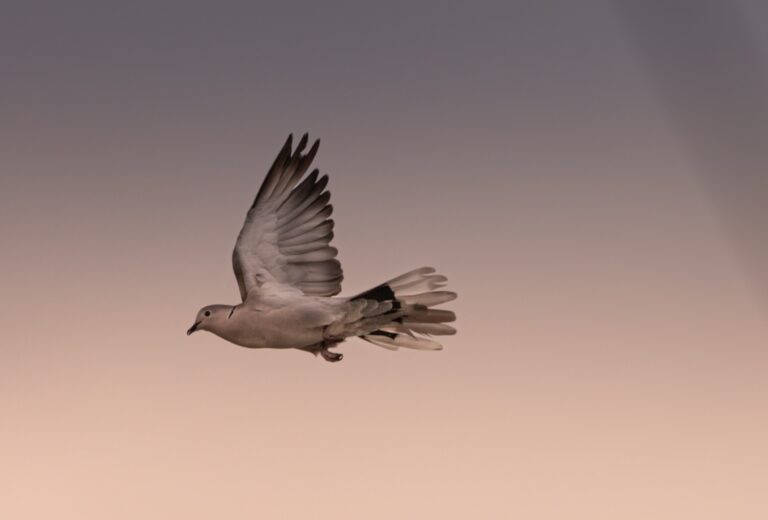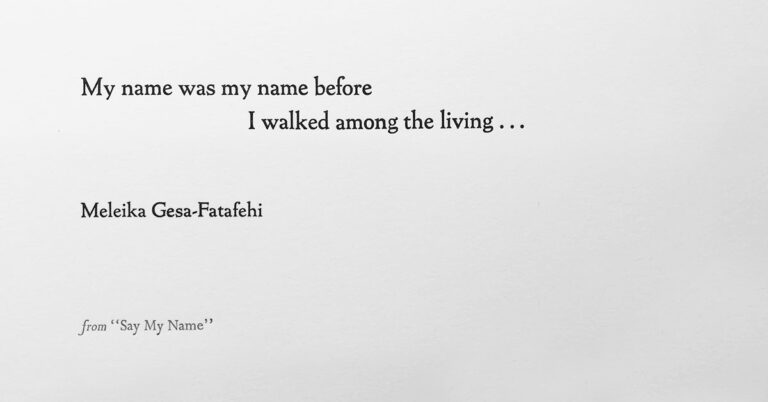Seán Hewitt
Suibhne is wounded, and confesses
In times of isolation, what stories have you turned to for comfort?
This poem is an exploration of isolation as seen through the mythical Irish character, Suibhne. Suibhne was cursed and lived a life on the move, a transitory isolation. In the midst of the sadness at all he’s missed, he also sees beauty — and he holds both sadness and appreciation together.
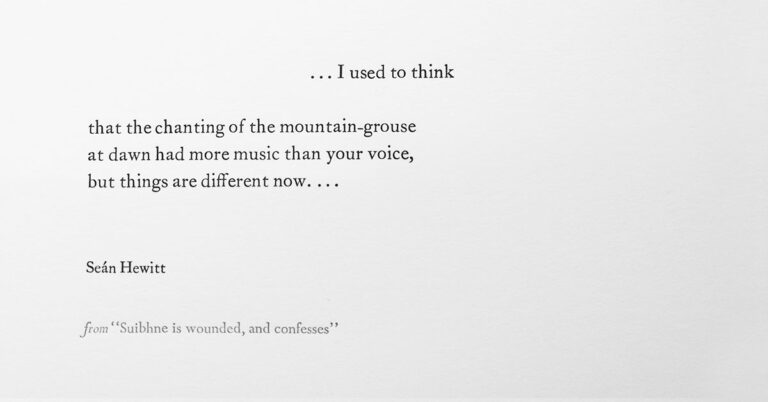
Image by Expedition Press/Expedition Press, © All Rights Reserved.
Guest
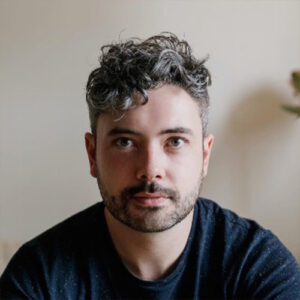
Seán Hewitt was born in 1990 and studied English at the University of Cambridge. He is a fiction reviewer for The Irish Times and a Leverhulme Research Fellow at Trinity College Dublin. His awards include the Northern Writers' Award, the Resurgence Prize, and an Eric Gregory Award. His debut book of poetry is Tongues of Fire.
Transcript
Pádraig Ó Tuama, host: My name is Pádraig Ó Tuama, and all my life, I’ve wanted to fit in, to fit into a nationality; to gender; to a religion; to a group of friends. And I never really felt like I did. And poetry didn’t answer that by saying, “Oh, I fit in with poets.” Poetry answered that by putting me in company with other people who put language around the idea of not fitting in and thinking that maybe there’s other questions I can ask myself rather than “Where will I fit in?”
[music: “Outstretched Hand” by Gautam Srikishan]
Ó Tuama: “Suibhne is wounded, and confesses” by Seán Hewitt:
“There was a time when I thought
the sound of a dove cooing and flitting
over a pond was sweeter than the voices
of friends. There was a time when
I preferred the blackbird and the boom
of a stag belling in a storm. I used to think
that the chanting of the mountain-grouse
at dawn had more music than your voice,
but things are different now. Still,
it would be hard to say I wouldn’t rather
live above the bright lake, and eat watercress
in the wood, and be away from sorrow.”
[music: “Outstretched Hand” by Gautam Srikishan]
Ó Tuama: The story of Suibhne comes from an 800-year-old poem, called Buile Suibhne, which means The Frenzy or The Madness of Suibhne. Suibhne is a name in Irish, from which Sweeney comes. And the story of who is, is a well-known story in certain circles in Ireland. Suibhne, the character who’s speaking in this poem, was a king, and that king had treated a local saint with aggression, when the saint went on his property. The king had rushed naked from his house to expel the saint from the property. And the saint was so disgusted with this that he cursed the king to be mad and to live at the edges of himself and society, wandering naked, living in trees, for the rest of his life.
And that’s what happened. And the whole saga of Suibhne is the story of Suibhne going in and out of society, being at the edges; going back to his homestead; seeing his family move on; seeing the repeated vengeance of the saint, who keeps on increasing the curses towards him. And the story really is a story of people who find themselves at the edges. Where will they find solace and comfort? Where might they find any sweetness?
Suibhne loves to eat watercress. And in Irish mythology, watercress is a plant that has healing properties, even magical properties. At times, in the Buile Suibhne, there’s moments when people, all of whom are under curses and distress, are in a meadow, and they’re all trying to get water from the well and eat the watercress. They’re all looking for some sweet kind of solace.
[music: “Every Place We’ve Been” by Gautam Srikishan]
Ó Tuama: There’s something I wanted to say, too, about mythologies and poetry. Partly I wanted to choose a poem for this season about a mythology that probably few people knew about so that everybody, on first hearing, might not understand it. So often, in poetry circles, there can be a presumption that people know the great myths. And I don’t know them at all. I was in a poetry class once, and somebody spoke about Penelope. And it seemed like everybody else in the class sighed with bliss and gladness and sadness, and I was wondering, Who the hell’s Penelope? She the poet’s boss, or lover, or neighbor? In fact, she’s a character from Greek mythology, from around the time of the Trojan Wars, whose mother was a nymph, but I didn’t know that. And so I was totally lost, wondering, How am I supposed to know who this person is and what their story is? And how am I supposed to understand and appreciate this poem when I don’t know the mythology?
And I think it can be a great thing — and more and more books, these days, when they are making reference to a piece of mythology, might have a small footnote in the back, a little bit of narrative hospitality to say, “This is a brief myth about these following things” so that if you’re not familiar with it, you can be brought into the story of the poem and get the reference a little bit. So I wanted to bring to the Poetry Unbound audience a mythology that probably people wouldn’t know, and to find a way to say, Even when you don’t know the mythology, you can find parts of the poem that, that rest you, and that to acknowledge, “Oh, I don’t know that story,” is no indication of failure. It’s just saying you don’t know the story and hopefully that there will be ways to make the story accessible.
[music: “Outstretched Hand” by Gautam Srikishan]
Ó Tuama: This poem is set toward the end of Suibhne’s life. He is just about to die, and he has actually found kindness in the company of another saint, [laughs] who isn’t nearly as vengeful as the saint who put the initial curse on him. And Suibhne’s looking back. And that’s why I think that this poem — if you know the story to it a little bit, you can realize the power of reflection in it. If you take out much of the language of this poem, you can see these lines: “There was a time”; “There was a time”; “I used to think”; “but things are different now”; “Still.” This is a poem looking back over the things that you had no control over, wishing that you could have had control over them, realizing that some of the things that were important to you at one point may not have been so important now — but even they have their own comfort.
Isolation and aloneness, I think, are two very different things. Chosen aloneness, or an aloneness that is there for a period of time in order to facilitate reflection, that can be a great educator. But isolation is something you can die from. And I think we need to always be aware about that. People who’ve had isolation forced on them, that’s torture.
Ó Tuama: I think of all of the isolation that so many of us have faced over 2020, as we think about coronavirus and all the impacts that that’s had and the way that the isolation, the sheltering in place that people have had as they’ve looked back to their life before — I’ve heard some people say, “Oh, I caught a train with some friends, do you remember that? 2019? How glorious that was?” Just speaking something small about being on a train, meeting up with your friends, having coffee or tea on the train and not worrying about how close you were or weren’t to somebody or whether somebody was coughing. And so there’s a way within which this poem holds together a torn experience of thinking back to times, and then thinking in times now, and finding sweetness and sadness in so many places.
And there’s a way within which the character in this poem, Suibhne, is realizing that in isolation, nature became really, really important. And that has been very true in 2020, also. We’ve heard some people saying, Oh, you know, it’s Earth healing itself. And I think there’s all kinds of complicated conversations to have about that, because there are so many people dying, and there are so many ways within which inequalities are being exposed. And, in the midst of admiring springtime, as I am here, or admiring summertime or admiring autumntime in the middle of the impact of coronavirus, the sweetness of observing nature doesn’t undo the fact that there’s other things that we’re not experiencing: the health of people, the increase toward racial justice and justice of including people in decision-making processes that affect them. And so nature is being extolled in this poem, but the extolling of nature that Suibhne has faced throughout his whole life — and he’s loved it; Suibhne’s always interested in the blackbird and the stag and the watercress — that has come at a great cost.
[music: “Every Place We’ve Been” by Gautam Srikishan]
Ó Tuama: So the title — and this really does hearken you back to the length of the story of Suibhne — Suibhne, at this stage, is close to death. And he had been told by that saint, Saint Rónán, that he would die with a spear or with the antlers of a stag in him. And he has just been wounded. And because the story — this story has been appropriated within to Christianity, there’s saints in it; some of them are great and some of them are terrible. But the story does end that Suibhne confesses his faith in the Church and then is taken off into heaven. And so the title of this is quite traditional — that he’s wounded, and then he confesses his need for God.
But when you go into the body of the poem, you see such tenderness, such yearning, and such tornness. And I think that one of the messages of tornness in this poem is really important. So many of us are torn, and so much of Irish mythology is about being torn, and, I think, in a certain sense, so many of the great stories that people gather is about being torn, torn between isolation and company; torn between nature and being present to other people; torn between your own, individual experience and torn between sharing that with other people. I look to myself, and I think, I’ve often felt torn between staying in Ireland and being overseas, or being inside religion or outside religion. I’m totally torn by the experience of the border and everything that’s happened in the last 100 years of Irish partition. And I’m torn between having friends in faraway places and then missing out on other things when I’m not in Ireland. And so in small ways, in my own life, the experience of being torn has been with me my whole life.
And I think that Seán Hewitt has done something brilliant by looking at Suibhne. And that in the midst of the curse he came face-to-face with great nature, that stag belling in a storm, and he saw the blackbird, and the dove cooing, and the mountain grouse with music in its voice, and that those beautiful things came with great lonelinesses. But that loneliness also came with great beauty.
[music: “At Dusk” by Gautam Srikishan]
Ó Tuama: “Suibhne is wounded, and confesses” by Seán Hewitt:
“There was a time when I thought
the sound of a dove cooing and flitting
over a pond was sweeter than the voices
of friends. There was a time when
I preferred the blackbird and the boom
of a stag belling in a storm. I used to think
that the chanting of the mountain-grouse
at dawn had more music than your voice,
but things are different now. Still,
it would be hard to say I wouldn’t rather
live above the bright lake, and eat watercress
in the wood, and be away from sorrow.”
[music: “At Dusk” by Gautam Srikishan]
Lily Percy: “Suibhne is Wounded and Confesses” comes from Seán Hewitt’s Tongues of Fire. Thank you to Cape Poetry who gave us permission to use Seán’s poem. Read it on our website, at onbeing.org.
Poetry Unbound is Chris Heagle, Erin Colasacco, Serri Graslie, Eddie Gonzalez, Lilian Vo, Christiane Wartell, Karen Navarre, Karyn Towey, Sue Ariza, and me, Lily Percy. Our music is composed and provided by Gautam Srikishan and Blue Dot Sessions. This podcast is produced by On Being Studios, which is located on Dakota land. We also produce other podcasts you might enjoy, like On Being with Krista Tippett, Becoming Wise, and This Movie Changed Me — find those wherever you like to listen or visit us at onbeing.org to find out more.
Books & Music
Recommended Reading
The On Being Project is an affiliate partner of Bookshop.org and Amazon.com. Any earnings we receive through these affiliate partnerships go into directly supporting The On Being Project.





